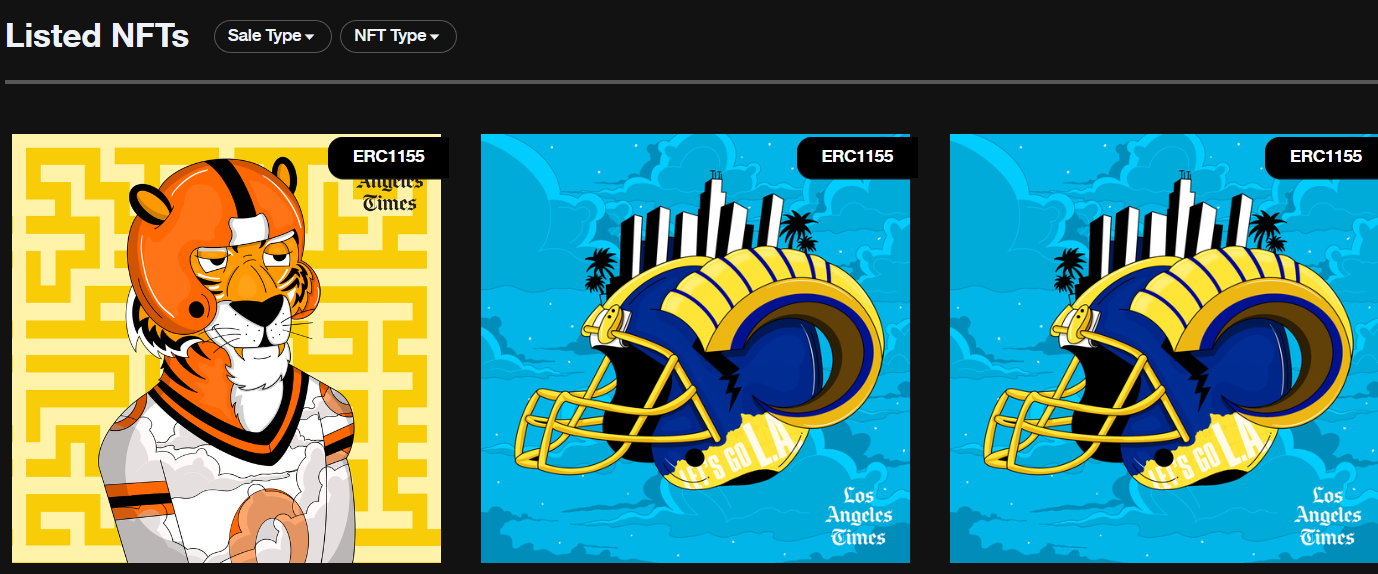People Who Bought the LA Times NFT Claim the Newspaper Scammed Them
Samson Amore is a reporter for dot.LA. He holds a degree in journalism from Emerson College. Send tips or pitches to samsonamore@dot.la and find him on Twitter @Samsonamore.

Last year, on the day of the 2022 Super Bowl, the Los Angeles Times announced they would be selling limited-edition collectible NFTs. At the time, a local newspaper getting into the NFT game seemed like an unlikely twist. But given that other publishing brands – including TIME Magazine and the New York Times – jumped headfirst into the hype a year prior, it wasn’t so surprising.
But since the announcement, buyers in the official Discord server set up by the Times alleged the entire project was a scam. “You and your team have no credibility,” one person said of the LA Times last June. “Just admit that we were scammed and our NFT's are worthless.”
The Times sold most of the NFTs for around $30. But the most expensive, a digital copy of the LA Times’ front page from Feb. 13 commemorating the Ram’s win, received bids as high as $4,000.
The problems with the Times’ NFT drop, however, began early. On the day the project went live, some users chimed in to the Discord to question GuardianLink, the Indian blockchain company tapped to set up the infrastructure for selling the NFTs. GuardianLink also operates the exchange BeyondLife.club, where the NFTs were traded.
Within a day of the launch, buyers also expressed concerns about their ability to resell the NFTs, since they were being traded on a foreign exchange where the NFL’s brand carries less heft.
Some read the project’s fine print, which stated that “you shall have the limited ability to sell or transfer your LA Times NFT,” and one user in the Discord noted that the sale would be voided and the owner of the NFT could lose their license if they tried to sell it on another platform. Many users expressed the desire to trade on OpenSea, a popular North American NFT exchange, instead.
In response to these concerns, one moderator from GuardianLink promised users on Feb. 14, 2022 that they would “soon” be able to trade their NFTs on other marketplaces, a promise that the buyers on Discord claim never came to fruition.
As one potential buyer pointed out in the Discord, “this isn't how NFTs work, or any merch/collectives actually. Since when [does] the company you buy something from keep the rights to control what you do with it.”
In the months after the announcement, skepticism morphed into concern, then outright anger as mods stopped responding to inquiries last September. “Bunch of crooks,” one buyer wrote in the Discord following the radio silence. “None of them give a s—.”
That same month, another Discord user said, “mods are not even online on this server. No communication… Just dead. We have been royally rugged!!”
One buyer claimed their only recourse was to take “legal action.” Though to date, no one has filed suit against the Times with regard to this situation.
It’s unclear how much total money was lost on the Times’ NFT sale. Vishal Master, a buyer from India, told dot.LA he lost $150, adding that he bought several NFTs ranging from $30- $50. Another buyer in the Discord said last June they lost $100.
According to LA Times spokesperson Hillary Manning, the blame resides with the crypto market. “While the offering was well-received, the overall NFT market declined – and later crashed – after we concluded the auction,” Manning said. “We understand the disappointment the NFT holders have experienced and have worked with our partner in good faith to address the feedback they received from holders, specifically by providing other items of value.”
Those items, according to Manning, included free digital subscriptions to the LA Times and discounts to its online store and were granted as a way to provide “other items of value” to disgruntled buyers.
Master, however, said he’d never heard from the Times about any of this. “Many tried but gave up” getting refunds, he added. “That NFT flopped and it surely was to dupe people [out of] money.”
In addition, the Times also offered buyers an additional free NFT. Master said he never received the free NFT either. Adding that even if he had, he and other buyers wouldn’t be able to sell those NFTs since they were still offered on GuardianLink’s BeyondLife platform. Which he added had meager demand, because the exchange is based in Asia, where fewer people have heard of the LA Times.
Ultimately, the ordeal caused some people in the Discord to question whether or not the trusted newspaper brand was even affiliated with the project. That said, the site where the NFTs were sold remains live and the Times appears to still be selling them.Samson Amore is a reporter for dot.LA. He holds a degree in journalism from Emerson College. Send tips or pitches to samsonamore@dot.la and find him on Twitter @Samsonamore.



 Image Source: Revel
Image Source: Revel
